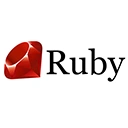Introduction
Blockchain technology has gained significant popularity for its applications in secure and decentralized systems. While languages like Solidity are commonly used for blockchain development, Ruby can be a powerful choice, particularly for smart contract development on blockchain platforms like Ethereum. In this guide, we'll explore the basics of using Ruby for blockchain development.
Prerequisites
Before you start, make sure you have the following prerequisites:
- Basic knowledge of the Ruby programming language
- An understanding of blockchain concepts and technologies
- A code editor (e.g., Visual Studio Code, Sublime Text)
Step 1: Set Up a Development Environment
For blockchain development with Ruby, you'll need to set up a development environment that includes the Ethereum client and the Solidity compiler. You can use tools like Truffle or embark to streamline the development process. Install these tools and create a new project directory.
Step 2: Write Smart Contracts in Solidity
While Ruby can be used for blockchain development, it is often used in conjunction with the Solidity programming language. Solidity is the standard language for writing smart contracts on the Ethereum platform. Here's an example of a simple Solidity smart contract:
// Solidity smart contract
pragma solidity ^0.8.0;
contract SimpleStorage {
uint256 storedData;
function set(uint256 x) public {
storedData = x;
}
function get() public view returns (uint256) {
return storedData;
}
}
Step 3: Interact with Smart Contracts Using Ruby
Ruby can be used to interact with smart contracts deployed on the blockchain. You can use the web3.rb library to communicate with Ethereum nodes and send transactions to smart contracts. Here's a simplified example of interacting with a smart contract using Ruby:
require 'web3'
require 'web3/eth/abi'
web3 = Web3::Eth::Rpc.new('http://localhost:8545')
contract_abi = JSON.parse(File.read('SimpleStorage.json'))['abi']
contract_address = '0x12345' # Replace with the actual contract address
simple_storage = web3.eth.contract(contract_abi).at(contract_address)
result = simple_storage.get
puts "Stored data: #{result}"
Conclusion
Ruby can be a valuable language for blockchain development, particularly when working with Ethereum and writing smart contracts in Solidity. This combination allows developers to create decentralized applications and automate complex processes on the blockchain. As you delve deeper into blockchain development, you can explore more advanced concepts, tools, and libraries to expand your capabilities in this exciting field.
Whether you're building decentralized applications or exploring blockchain technology, Ruby offers a familiar and powerful language to get started with blockchain development.

